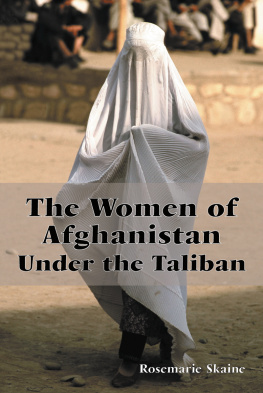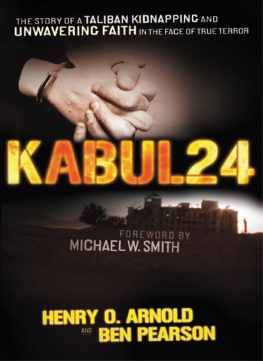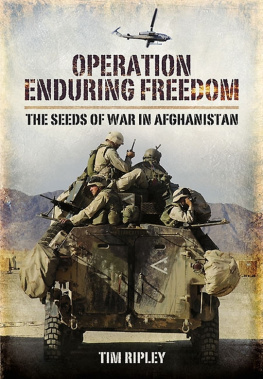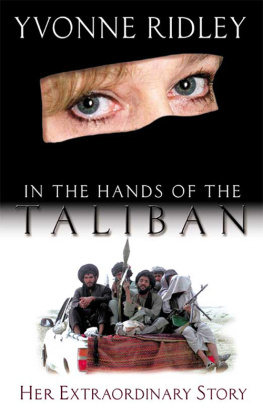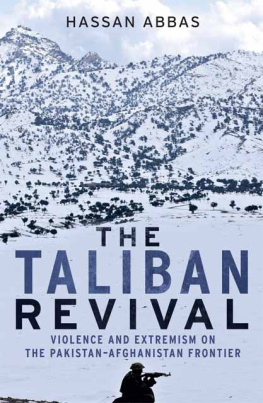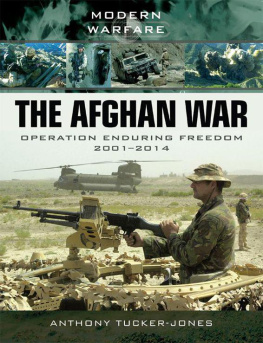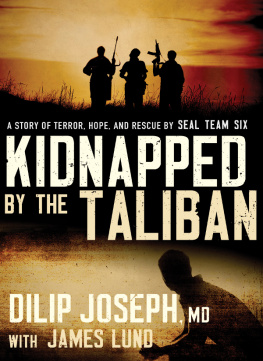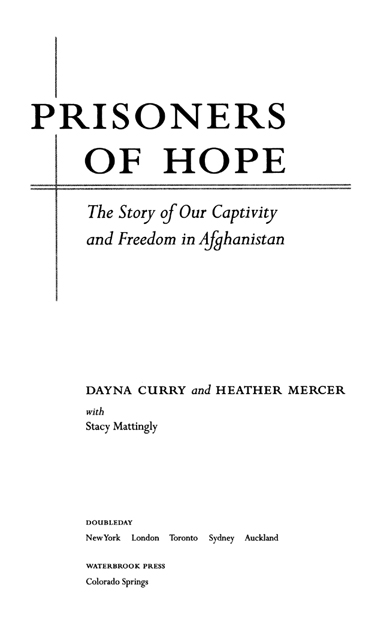The authors wish to clarify that the agency with whom they worked in Afghanistan is Shelter Germany and not Shelter Now International, which is a separate organization.
P RISONERS OF H OPE
P UBLISHED BY W ATERBROOK P RESS
12265 Oracle Boulevard, Suite 200
Colorado Springs, Colorado 80921
A division of Random House, Inc.
eISBN: 978-0-307-55256-3
Copyright 2002 by The Hope Afghanistan Foundation
All rights reserved. No part of this book may be reproduced or transmitted in any form or by any means, electronic or mechanical, including photocopying and recording, or by any information storage and retrieval system, without permission in writing from the publisher.
W ATER B ROOK and its deer design logo are registered trademarks of WaterBrook Press, a division of Random House, Inc.
Prisoners of Hope was originally published in hardcover by Doubleday and WaterBrook Press in 2002.
The Library of Congress has cataloged the hardcover editions as follows:
Curry, Dayna.
Prisoners of hope : the story of our captivity and freedom in Afghanistan / Dayna Curry and Heather Mercer with Stacy Mattingly.
p. cm.
1. Curry, Dayna. 2. Mercer, Heather. 3. Christian biographyAfghanistan. 4. Political prisonersAfghanistanBiography. I. Mercer, Heather. II. Mattingly, Stacy. III. Title.
BR1725.C846A3 2002
266.0092273dc21 2002025984
v3.1
To those who gave heart and soul through prayer and practical service to bring us home alive. Words cannot express our thanks. May you be blessed for your courage, love, and sacrifice.
To the Afghan people whom we so dearly love. May you see the day of true liberation for your country and this generation.
To our Lord and Savior Jesus Christ. Your everlasting love has healed our hearts and set us free. May we honor and love you with all that we are for all of our days.
CONTENTS
PROLOGUE
AUGUST 3, 2001
Dayna: I was already behind schedule when I pulled the Aamirs door shut and stepped into the courtyard. The air was hot and dry, and the late-afternoon sun played over the dirt yard. The gate to the alley, which the family usually left open, was bolted. Soofias mother, who was washing clothes in a plastic tub, unlocked the gate and let me onto the mud alley. She was the only family member out-of-doors. I had left everyone else in the room with Heather watching that film, which was playing in the DVD drive of my laptop.
I looked both ways before stepping from the alley onto the dirt road to make sure no Taliban guards were out. We always took this precaution when leaving Afghan homes, as the countrys ruling Taliban forbade foreigners to visit with Afghans. The street was quiet. My taxi driver, Abdul, was waiting for me at the bottom of the hill. I quickly slipped into the back seat and we started down the unpaved road toward the Taliban checkpoint marking the entrance to Sherpur, the name for this Kabul neighborhood of mud houses.
The time was 4:30. I was due to meet Lillian and the others downtown before having to be back in our neighborhood, Wazir Akhbar Khan, by 6:00 for a meeting with my Shelter Germany coworkers. At Lillians, I was to meet an Afghan woman whom we were considering introducing to our Afghan friend Rashid. I would have only a short time to visit and was thinking about the meeting as Abdul started down the bumpy road out of the Aamirs neighborhood.
We hadnt gone ten feet when a young man dressed in civilian clothes and a colorful skullcap approached the passenger side of the car. He ordered Abdul to stop the taxi, but Abdul continued on. The young man repeated himself several times in an angry tone: Stop! Stop!
Finally, Abdul relented, and the stranger got into the front seat. I remembered having been warned that if an Afghan man ever got into my taxi I was supposed to get out and find another taxi. You were never to ride in a car with an Afghan man, and especially not a strange one.
Chera? I asked Abdul in Dari, or Afghan Farsi. Why? Abdul was one of our regular taxi drivers and had been taking Heather and me around Kabul for months. He knew better than to let this man into the car.
Before Abdul had time to answer, the stranger turned to me and said, Wheres the other woman? He spoke first in Pashtu, the language of the Taliban. Then he asked again in Dari so I could understand.
I dont know you, I replied, unsure what was going on. Its not right for you to ask about another girl. Who are you?
The man ignored me.
Im going to a meeting, I said politely, though making it clear I was upset. I dont know where youre going. I dont know if were going in the same direction. Maybe I should get another taxi.
Be quiet, the man snapped. You dont need another taxi. He turned around and looked at me. His piercing blue eyes stunned me with their hatred. I had experienced the same feeling a month earlier when an Arab man standing on a corner in downtown Kabul spit in my direction as I walked by and then pelted me with a clod of dirt.
The man in the front seat took a walkie-talkie from his pocket and spoke into it, and within seconds a white Toyota Corolla hatchback pulled out in front of us carrying half a dozen men wearing large white turbans. These, I realized with a growing sense of unease, were the religious police from the Talibans Ministry for the Promotion of Virtue and Prevention of Vicethe men who whipped women begging alone on the street and beat men off their bicycles for failing to be at the mosque during prayer.
Now, with greater urgency, I told the man in the front seat as we drove on: I have a meeting. I have to be there. Who are you? Where do you work?
He didnt answer.
Who are you? I repeated. Who are you with? Where do you work?
The man seemed greatly annoyed with my talking. Ryaasat, ryaasat, he said sharply. Government, government.
I changed my approach: Please take me to my boss. He lives just over here in Wazir. I am a girl alone. This is not right.
You can see your boss later, he said.
Abdul kept a cool expression, but I saw fear in his eyes. He looked at me apologetically in the rearview mirror.
We came to the end of the neighborhood road and slowed down to take a right onto the main street. Many taxis waited at the intersection. I thought I would try to get out of Abduls taxi and into another one. I opened the car door while we were still moving.
The man in the front seat saw what I was thinking and radioed to the Toyota of Taliban in front of us. We stopped abruptly. Before I could make a move, one of the white-turbaned men got out of his vehicle and came around to the back seat of our car. He got in beside me and laid a whip across his lap.
This is wrong for you to be in this car with me, I again complained. I am a single woman.
We are not infidels, the man in the front seat remarked gruffly, turning around.
Im not an infidel either, I exclaimed. I love God. He looked at me with disgust.
In another few minutes, we arrived at a building in the center of Kabul. Behind the buildings high wall I could see rows of black Toyota pickup trucks, the Talibans vehicle of choice. As Abdul brought the taxi to a stop, I saw Taliban armed with guns and whips circling the area.
The man in the front seat took my bag and rifled through it. It is not here, I heard a man say. It must be with the other one. Someone will have to go back. He then got out of our car, walked over to the accompanying truck, and exhanged his skullcap for a turban. Some men moved me to another vehicle, and Abdul drove away in his taxi.


